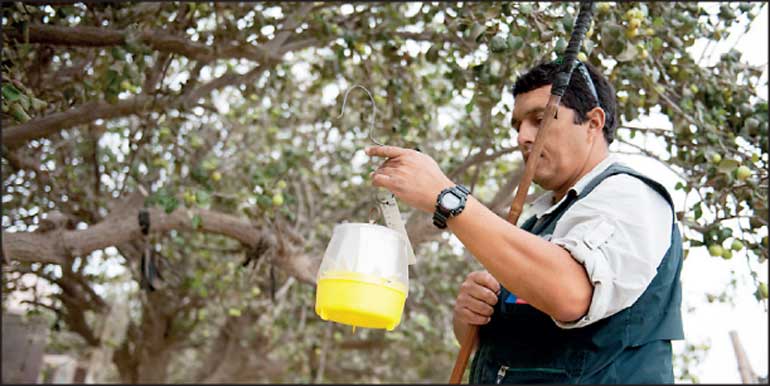Wednesday Feb 25, 2026
Wednesday Feb 25, 2026
Wednesday, 6 April 2022 01:23 - - {{hitsCtrl.values.hits}}
 Plant pests and diseases cause food crop losses of up to 40%, according to FAO estimates
Plant pests and diseases cause food crop losses of up to 40%, according to FAO estimates
A key meeting on measures to protect plant health got underway yesterday in Rome amid heightened advocacy efforts and moves to set global plant health standards, helping to protect human health and food security.
The Commission on Phytosanitary Measures (CPM), the governing body of the International Plant Protection Convention (IPPC), began its 16th session on 5 April.
In her opening remarks, The Food and Agriculture Organisation of the United Nations (FAO) Deputy Director-General Beth Bechdol spoke of “crucial opportunities ahead of us” for raising the profile of plant health issues, with the first celebration of the International Day of Plant Health to be organised by FAO on 12 May and the first International Plant Health Conference, to be hosted by the United Kingdom in September this year.
Bechdol thanked Finland for its leadership in implementing the International Year of Plant Health, which came to a close in July 2021, and Zambia for championing the declaration of an annual International Day of Plant Health, which was decided on by the 76th Session of the UN General Assembly last week.
The last year also saw increased cooperation with the Comité de Liaison Europe-Afrique-Caraïbe-Pacifique, resulting in a Memorandum of Understanding (MoU0 “that will trigger the development of advocacy materials and e-learning courses for use by phytosanitary practitioners around the world,” Bechdol noted.
Plant pests and diseases cause food crop losses of up to 40%, according to FAO estimates and the damage they cause to agriculture exacerbates the major issue of growing world hunger and threatens rural livelihoods.
Against this background, ongoing work on the adoption of IPPC standards will help countries as they seek to put in place best practices in plant health and safe trade.
“The current challenges we are witnessing today leave us with no option but to join our efforts and show full commitment towards the mitigation of the effects of the risks by adopting the IPPC standards and applying them at country and regional levels,” CPM Chairperson Lucien Kouame Konan said.
The meeting this week marks the first under the tenure of Osama El-Lissy as IPPC Secretary, who said: “The safe trade of healthy plants and plant products across borders form the basis of the food value chain and the fight against world hunger. Without plant production, there will be no food for humans or feed for animals.” El-Lissy added: “The IPPC has an essential role in providing the required knowledge and policies to secure the safe movement of billions of plants and plant products across borders, and consequently to support the Sustainable Development Goals and leave no one behind.”
With a total of 184 contracting parties, the IPPC is celebrating its 70th anniversary as the only international or UN entity mandated for setting standards to protect plants and plants products across borders and facilitate safe and efficient plant trade globally.
Among the significant developments since the start of the COVID-19 pandemic, the IPPC ePhyto Solution, has helped 106 countries to exchange digital phytosanitary certificates to expedite safe, efficient, and low-cost trade in plants and plant products.
Meanwhile, Phytosanitary Capacity Evaluation has helped over 80 countries on all continents to improve their phytosanitary systems and revise their phytosanitary legislation through trained facilitators.
The process aims at modernising the countries’ phytosanitary legislation and ensuring confidentiality and protecting countries’ sovereign rights.
The IPPC Secretariat is also committed to engaging in setting up a global pest outbreak alert and response system to assist countries to prepare for and respond to emerging pests to protect their territories and their access to export markets.